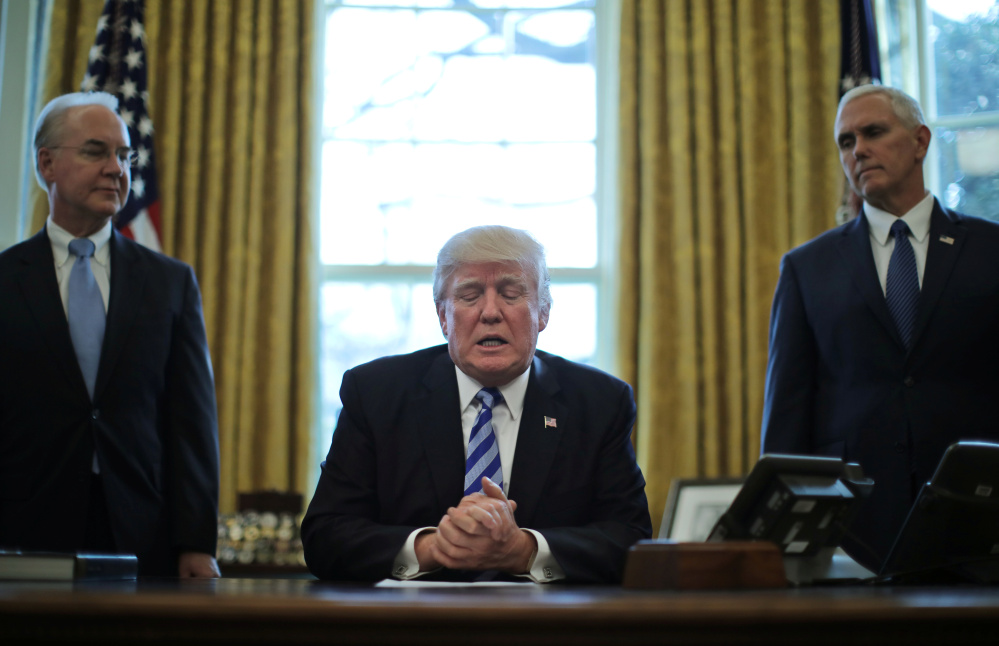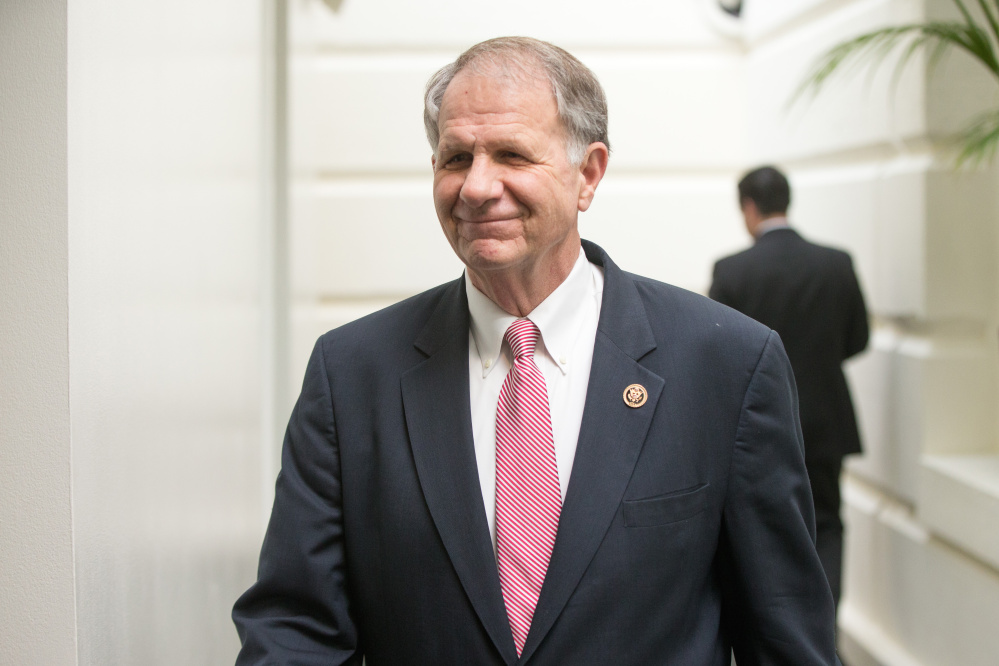President Trump cast blame Sunday for the collapse of his effort to overhaul the health care system on conservative interest groups and far-right Republican lawmakers, shifting culpability to his own party after initially faulting Democratic intransigence.
His attack – starting with a tweet that singled out the House Freedom Caucus and the influential Club for Growth and Heritage Action for America – marked a new turn in the increasingly troubled relationship between the White House and a divided Republican Party still adjusting to its unorthodox standard-bearer.
And it served as a warning shot – with battles still to come on issues such as tax reform and infrastructure spending that threaten to further expose Republican fractures – that Trump will not hesitate to apply public pressure on those in his party he views as standing in the way.
In a sign Sunday of the ripple effects on the Republicans’ conservative flank, one high-profile member of the Freedom Caucus, Rep. Ted Poe, R-Texas, resigned from the group and took a swipe at its opposition to the Trump-backed health care bill.
“Saying ‘no’ is easy, leading is hard,” Poe said.
The rising tensions followed a flurry of finger-pointing after Friday’s decision by Trump and House Speaker Paul Ryan, R-Wis., to pull the health care measure, effectively ending for now the Republicans’ years-long quest to repeal former President Barack Obama’s signature domestic policy achievement.
Not long ago, many Republican leaders, even as they were wary of Trump’s unusual background and style, had considered his presidency a chance to finally unify the party around passing its agenda of long-sought policies.
But now, in the health care bill’s raw aftermath, Republican leaders are learning that the Trump presidency is doing little, if anything, to heal their party.
“We’ve been here before,” said Rep. Charlie Dent, R-Pa., co-chairman of the centrist Tuesday Group. “The only difference is now we have a Republican president, and some people thought the fever might break a little bit. But apparently not.”
Trump’s attack Sunday had the look of a coordinated effort.
His tweet appeared at 8:21 a.m. as official Washington prepared to tune into Sunday news shows: “Democrats are smiling in D.C. that the Freedom Caucus, with the help of Club For Growth and Heritage, have saved Planned Parenthood & Ocare!”
Less than an hour later, White House Chief of Staff Reince Priebus appeared on television to echo his boss’ sentiments, saying his missive hit “the bull’s eye.”
As if to rub salt in the Republicans’ wound, Priebus hinted that Trump may simply start looking past the Republican majority and try forging more consensus with moderate Democrats in future legislative battles. He pointed to the Freedom Caucus and the Tuesday Group for heavily resisting the health care bill.
“We can’t be chasing the perfect all the time,” Priebus said during an appearance on “Fox News Sunday.” “I mean, sometimes you have to take the good and put it in your pocket and take the win.”
Although Trump targeted conservative opponents of the bill Sunday, he has also shown signs of frustration with its moderate critics. On NBC’s “Meet the Press,” Dent acknowledged that Trump told him in a private meeting that Dent was “destroying the Republican Party” and that he “was going to take down tax reform,” as first reported by the New York Times magazine.
PRESIDENT SOURING ON REP. RYAN?
Trump’s tweet came a day after a strange episode that prompted speculation that he was seeking to undermine Ryan’s standing. Trump encouraged his Twitter followers Saturday to watch Jeanine Pirro, one of his favorite Fox News Channel hosts, that night.
On her program, Pirro said that Ryan should resign as speaker, adding that despite his “swagger and experience,” he presided over a failed effort that allowed “our president in his first 100 days to come out of the box like that.”
Priebus, in his Sunday appearance, dismissed the episode as a coincidence, and Trump has said in recent days that he has a good relationship with Ryan.
“He doesn’t blame Paul Ryan,” Priebus said on Fox News. “In fact, he thought Paul Ryan worked really hard. He enjoys his relationship with Paul Ryan, thinks that Paul Ryan is a great speaker of the House.”
Nonetheless, the episode served to highlight the challenges ahead for Ryan in attempting to regain control over House Republicans and maintain a working rapport with the White House.
Doug Heye, a Republican strategist and former congressional aide, said Republicans’ inability to forge consensus on health care shook the party to the core.
“It’s hard to see where we can be successful, and it leads to a lot of questions as to whether Republicans can govern, even with a Republican in the White House,” he said.
White House budget director Mick Mulvaney, a Republican former congressman who helped found the Freedom Caucus, was at a loss Sunday to explain why so many of those members were not prepared to vote for the health care bill.
Speaking on “Meet the Press,” Mulvaney asserted that conservatives were not the only ones to blame, saying, “It was a bizarre combination of who was against this bill, some folks in the Freedom Caucus and then moderates on the other end of our spectrum.”
Rep. Mark Meadows, R-N.C., who heads the Freedom Caucus, responded to the tweet without any animosity toward the president.
“I mean, if [Democrats are] applauding, they shouldn’t, because I can tell you that conversations over the last 48 hours are really about how we come together in the Republican Conference and try to get this over the finish line,” he said on ABC’s “This Week with George Stephanopoulos.”
A spokeswoman for the Freedom Caucus did not comment on Trump’s tweet or Poe’s departure. It was unclear whether Trump’s statement had a direct effect on Poe’s decision to leave the caucus.
MANEUVERING WITH THE FAR RIGHT
The tweet directed at the Freedom Caucus was “a reminder that nothing goes without notice,” said one Trump associate with direct knowledge of White House strategy.
The Trump associate, who spoke on the condition of anonymity because he is not authorized to speak for the White House, said Trump was disappointed in Meadows and others in the caucus and wanted to remind them that he can use his powers to make their lives more difficult if they are not with him in the future.
The Club for Growth and Heritage Action for America, which is an affiliate of the Heritage Foundation, a longtime conservative think tank, are known for staking out positions that are often at odds with those of Republican leaders.
On Sunday, Heritage Action defended the House Freedom Caucus’ decision not to support the health care legislation while striking a conciliatory tone with the president.
The bill “had no natural constituency and was widely criticized by conservative health care experts because it left a premium-increasing provision of Obamacare in place,” said Dan Holler, a spokesman for Heritage Action. “We now have the opportunity to reset the debate, and conservatives are eager to work with the administration and congressional leadership as things move forward.”
The Club for Growth did not respond to requests for comment.
The House Republican bill would have repealed and replaced key parts of the Affordable Care Act. It came under consistent criticism from both ends of the political spectrum. Ryan and Trump pulled the bill Friday afternoon after deciding it could not pass, after weeks of negotiations with conservative and centrist Republican members of the sizable Republican House majority.
Although Ryan’s job doesn’t appear to be in jeopardy, his ability to shepherd the rest of the Republican agenda through his chamber is in doubt.
Some Freedom Caucus members are wary of efforts that would add to the federal deficit. But in a sign that Meadows may be willing to compromise on tax reform, he said tax cuts don’t necessarily have to be paired with spending cuts or revenue increases.
“Does it have to be fully offset? My personal response is no,” he said on ABC.
MODERATE DEMOCRATS AS ALLIES
Since Friday, Trump aides have been talking increasingly about reaching out to moderate Democrats for help not only on another health care bill, but also on other priorities. But prospects for such cooperation remain poor.
There has been virtually no outreach to Democrats about a tax reform package. Although Democrats like the idea of infrastructure spending, the parties have different visions of how it should be paid for.
“If he aims a proposal . . . at the middle class and the poor people . . . we could work with them. But I don’t think they’re headed in that direction, and they’re going to repeat the same mistake” they made with the health care bill, Senate Minority Leader Charles Schumer, D-N.Y., said of tax reform on “This Week.”
Aides and advisers to Trump say it’s clear that he will need support from some Democrats, particularly in the Senate, to move parts of his agenda forward beyond tax reform.
Michael Steele, who was a senior aide to then-Speaker John Boehner, R-Ohio, said Trump is at a crossroads as he takes up tax reform.
“The president is going to have a choice: to reach out to moderate Democrats and work in a bipartisan fashion,” Steele said, “or to reach out to recalcitrant Republicans in his own party that he wasn’t able to get this time.”
Send questions/comments to the editors.




Success. Please wait for the page to reload. If the page does not reload within 5 seconds, please refresh the page.
Enter your email and password to access comments.
Hi, to comment on stories you must . This profile is in addition to your subscription and website login.
Already have a commenting profile? .
Invalid username/password.
Please check your email to confirm and complete your registration.
Only subscribers are eligible to post comments. Please subscribe or login first for digital access. Here’s why.
Use the form below to reset your password. When you've submitted your account email, we will send an email with a reset code.